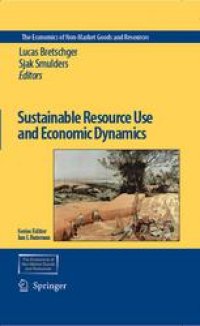
Ebook: Sustainable Resource Use and Economic Dynamics
- Tags: Environmental Economics, Sustainable Development, Environmental Monitoring/Analysis
- Series: The Economics Of Non-Market Goods And Resources 10
- Year: 2007
- Publisher: Springer Netherlands
- Edition: 1
- Language: English
- pdf
30 years after the publication of the famous symposium issue of the Review of Economic Studies, which started the neoclassical literature on growth theory and resource economics, this volume seeks to reinforce research efforts in order to provide adequate solutions for today’s challenges in the field of sustainable development. It compiles innovative current research from resource, energy and environmental economics and dynamic economic theory. It contains both new approaches as well as detailed surveys of the existing literature.
The chapters in the book cover a broad range of aspects regarding the relationship between natural resource use and long-term economic development. In particular, the following topics are studied: incentives for adoption and diffusion of clean technology, resource scarcity and limits to growth, international convergence of energy intensity, and the social norms shaping resource depletion.
The topic of this volume is of high interest with regard to the future development of the world economy. In the past two centuries, many countries experienced an unprecedented increase in living standards. At the same time, pollution of the environment increased while the stock of worldwide natural resources declined. Consequently, the concern that environmental restrictions, especially the bounded supply of natural resources end energies, will limit economic development in the long run is widespread. Most prominently, it has been expressed in the prediction of ‘limits to growth’ by the Club of Rome in the 1970s. Today, the notion of ‘sustainable growth’ is widely accepted as a main principle in the theoretical and political discussion. But a general consensus on the consequences for the use of natural capital has still to be established. This holds true not only for economics, but also for interdisciplinary research programs and the public debate. Therefore, more research should be directed at finding and establishing the rules for a world society which is intrinsically compatible with its natural environment.
What does sustainability mean for resource and energy use, what are the economist’s predictions for the impact of natural resource use on the welfare of future generations? The different contributions in the present volume shed light on important subjects related to these fundamental questions.
Chapters 2, 3, 6, 8 and 9 are reprinted from Environmental & Resource Economics, Vol. 36, No. 1, 2007.
30 years after the publication of the famous symposium issue of the Review of Economic Studies, which started the neoclassical literature on growth theory and resource economics, this volume seeks to reinforce research efforts in order to provide adequate solutions for today’s challenges in the field of sustainable development. It compiles innovative current research from resource, energy and environmental economics and dynamic economic theory. It contains both new approaches as well as detailed surveys of the existing literature.
The chapters in the book cover a broad range of aspects regarding the relationship between natural resource use and long-term economic development. In particular, the following topics are studied: incentives for adoption and diffusion of clean technology, resource scarcity and limits to growth, international convergence of energy intensity, and the social norms shaping resource depletion.
The topic of this volume is of high interest with regard to the future development of the world economy. In the past two centuries, many countries experienced an unprecedented increase in living standards. At the same time, pollution of the environment increased while the stock of worldwide natural resources declined. Consequently, the concern that environmental restrictions, especially the bounded supply of natural resources end energies, will limit economic development in the long run is widespread. Most prominently, it has been expressed in the prediction of ‘limits to growth’ by the Club of Rome in the 1970s. Today, the notion of ‘sustainable growth’ is widely accepted as a main principle in the theoretical and political discussion. But a general consensus on the consequences for the use of natural capital has still to be established. This holds true not only for economics, but also for interdisciplinary research programs and the public debate. Therefore, more research should be directed at finding and establishing the rules for a world society which is intrinsically compatible with its natural environment.
What does sustainability mean for resource and energy use, what are the economist’s predictions for the impact of natural resource use on the welfare of future generations? The different contributions in the present volume shed light on important subjects related to these fundamental questions.
Chapters 2, 3, 6, 8 and 9 are reprinted from Environmental & Resource Economics, Vol. 36, No. 1, 2007.